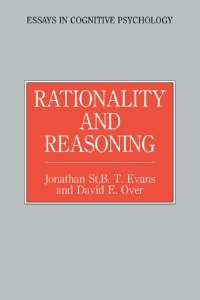- ホーム
- > 洋書
- > 英文書
- > Business / Economics
Full Description
The AI Metaverse Revolution: Transforming Multi-Business Scenarios (Volume 2) explores the profound convergence of Artificial Intelligence (AI) and the Metaverse, and its transformative effects on business decision-making and strategy. As these technologies evolve, they offer businesses unprecedented tools for operating more efficiently, engaging customers in innovative ways, and responding to rapidly shifting market dynamics. By examining the role of AI in analysing vast data sets and the insights gained from virtual environments within the Metaverse, this volume provides a comprehensive guide to harnessing these cutting-edge technologies for competitive advantage.
Through in-depth analysis and real-world examples, the diverse range of global contributors explore how AI and the Metaverse are driving a new era of business possibilities across industries. From AI-powered data analysis that enables businesses to make informed, real-time decisions; to personalised customer experiences created through behavioural analysis in virtual spaces, this volume presents actionable strategies for integrating AI and the Metaverse into modern business practices. It offers readers a roadmap for navigating this technological revolution, positioning AI and the Metaverse as essential components of future-proof business strategy.
Contents
Chapter 1. Exploring the Role of Generative Artificial Intelligence among Employees in the Hospitality Sector: Insights from an Extension of the Job Demands-Resources Theory; Muhammad Ashoer, Haroon Iqbal Maseeh, Xin-Jean Lim, Ainur Rofiq, and Achmad Zulkarnain Zaenal
Chapter 2. Navigating the Metaverse: Unveiling the Digital Frontier of Connectivity and Interaction; Ruchika Vermani and Neha Arora
Chapter 3. The Metaverse Chronicles: Success Stories in Virtual Retail; Sreevatsa Bellary and Ananya Hadadi Raghavendra
Chapter 4. Tourist Behaviours, Expectations, and Experiences toward Events and Festivals: Amalgamation of Metaverse Technological Innovation and Artificial Intelligence; Nazirullah, Farhat Ullah, Asif Mahmood, Mohamad Sobri Bin Hamid, Hazim Ryad Momani, Saaherah Basil Alkilany, and Sabeeha Rahman
Chapter 5. Exploring the Role of Artificial Intelligence in Transformation of Metaverse: Issues and Challenges; Bala Saraswathi Atluri and Pooja Uppalapati
Chapter 6. Unveiling AI-Based Metaverse Potential in Green Supply Chain Management Achieve Sustainable Results: Moderating Effect of Dynamic Capabilities in Cybersecurity Intelligence; Pham Quang Huy and Vu Kien Phuc
Chapter 7. Navigating the Ethical Landscape of Artificial Intelligence Adoption: Exploring Principles, Challenges, and Implications; Deepa Saxena
Chapter 8. Unlocking Metaverse in Education: Future Research Trends Using Bibliometrics; Rita Devi, Rachna Bhopal, and Nazma
Chapter 9. Social Engagement Strategies in the Metaverse: Fostering Customer Loyalty in Tourism and Hospitality; Rupam Konar, Md. Tariqul Islam, Lazey Doma Bhutia, and Stéphanie Milian
Chapter 10. The Potential of Artificial Intelligence in Enabling SDGs; Syed Haider Ali Shah, Eman Zameer Rahman, Majid Murad, and Muhammad Jaffer
Chapter 11. Metaverse Integration: Paving the Path from Industry 4.0 to Industry 5.0; Mohit Kumar Ojha and Priyanka Gujrati
Chapter 12. Eco-Friendly Employee Training on the Metaverse: Promoting Environmental Awareness and Sustainability Skills; Nisha Devi, Arun Aggarwal, and Ishani Sharma
Chapter 13. Virtual Festivals and Events: Redefining Creative Tourism in the Metaverse; Ishani Sharma, Arun Aggarwal, and Nisha Devi
Chapter 14. Exploring SERVQUAL Dimensions and Their Influence on Tourist Satisfaction in Virtual Tourist Experiences: A Proposed Framework; Aishath Shany Habeeb, Kandappan Balasubramanian, and Rokhshad Tavakoli
Chapter 15. The AI Metaverse Revolution: For Transforming Sustainable Multi-Business Scenario; Monika Chandel and Manpreet Arora
-

- 洋書電子書籍
- Rationality and Rea…







